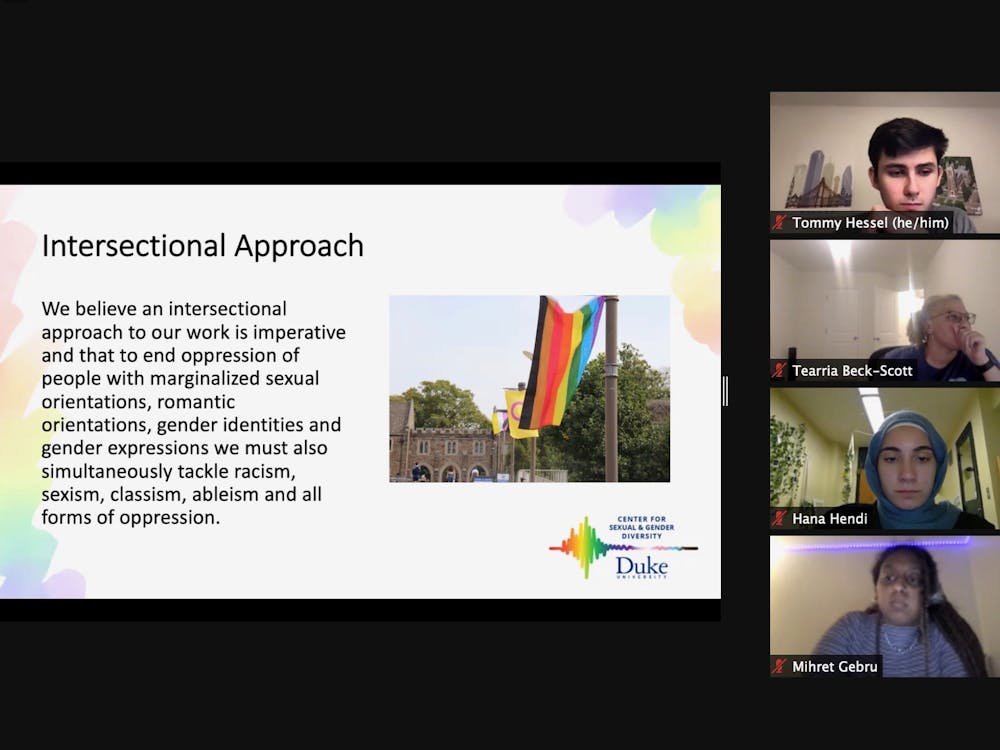Despite limited staffing, Duke’s administration and student groups are still working together to oppose oppression due to gender and sexual identity, Nicholas Antonicci, the director of the Center for Sexual and Gender Diversity, told Duke Student Government senators at their Wednesday meeting.
CSGD, one of seven identity and cultural centers under Student Affairs, aims to create an inclusive campus community for those with “marginalized sexual orientations, gender identities and gender expressions,” according to its website.
To fulfill their mission, CSGD “simultaneously tackles racism, sexism, classism, ableism, and any and all forms of oppression,” Antonicci said. “I tend to think that we’re not doing our work very well if we’re not taking an intersectional approach.”
CSGD’s resources include “education, advocacy, support, mentoring, academic engagement, and providing space.” Its staff not only offer one-on-one support to students, but also host in-group spaces, which are specifically for students “holding similar identities to connect around those identities,” according to its website.
After opening for in-person activities at the end of January, CSGD also offers crafting activities, movie screenings, and study spaces for students, Antonicci said.
CSGD works with the 14 LGBTQ+ student organizations at Duke, serving as the advisor to two: Blue Devils United, which seeks to provide social opportunities, outreach and advocacy for LGBTQ+ students and allies, and Athlete Ally, which works to support the LGBTQ+ community in sports.
“We can’t do this work on our own,” Antonicci said.
Alongside student groups, CSGD considers how it can “help departments across Duke think about their policy and practice and how it can better be suited to create better experiences for LGTBQ+ and trans and nonbinary students,” he said.
This includes providing training and resources for faculty and staff about how to share pronouns and the importance of using pronouns to “contribute to a positive environment for trans and non-binary students,” Antonicci said. A new training this semester, Pronoun Primer: A Path to Inclusion, comes after DukeHub’s implementation of pronouns in December.
Junior Ramya Ginjupalli, DSG vice president of campus life, asked if there were any demographics on campus that CSGD hopes to work with more. Antonicci responded that even though CSGD often teams up with student interest groups, “it never really feels like enough.”
“We are thinking about additional support for Black LGBTQ+ students, thinking about additional support for Muslim queer and trans folks,” said Antonicci. “There’s some amazing work that’s happening, and that’s work we want to be involved with. But we often have to think right now, ‘What is our bandwidth?’”
CSGD, which traditionally has a staff of four full-time professionals, five undergraduate programming assistants, and one graduate assistant, is short-staffed and doesn’t have enough people to provide the desired extent of support, he said.
In other business
The Senate recognized student group Sling Health Duke, a local chapter of the national organization, which aims to bring students, clinicians and local entrepreneurs together to “develop and commercialize solutions” that improve patient health care, according to their application.
Senators passed a budgetary statute, in which the Information Technology Advisory Council allocated $50 to be distributed to five students who completed the 2021 Undergraduate Information Technology Survey.
One new Board of Elections member, senior Jimmy Toscano, was confirmed.
Senators approved revised judiciary bylaws after a second reading of the new version and conducted a first reading of revised Senate bylaws.
Get The Chronicle straight to your inbox
Signup for our weekly newsletter. Cancel at any time.

Milla Surjadi is a Trinity junior and a diversity, equity and inclusion coordinator of The Chronicle's 119th volume. She was previously editor-in-chief for Volume 118.

